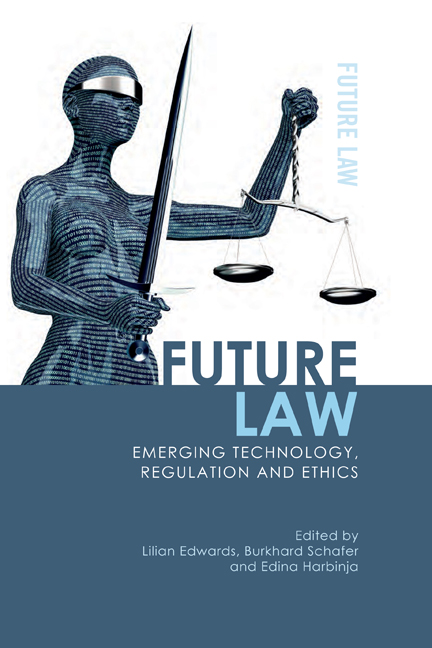Book contents
- Frontmatter
- Contents
- List of Contributors
- List of Figures and Tables
- Table of Cases
- Table of Legislation
- 1 The Future’s Already Here: It’s Just Unevenly Edited
- Part I From Privacy and Princesses, to Security and Star Wars
- 2 Privacy and Identity through the Eyes of Disney Princesses
- 3 White Noise from the White Goods? Privacy by Design for Ambient Domestic Computing
- 4 Citizen-consumers in a Personalised Galaxy: Emotion-influenced Decision Making, a True Path to the Dark Side?
- 5 Big Data Ethics: Darth Vader and the Green Cross Man
- 6 Security Vulnerabilities, Backdoors, Exploits and the Marketplace for Each: The Return of Boba Fett – Bug Bounty Hunter in the New Republic
- Part II A Matter of (Future) Life and Death
- 7 Will My Genes Really Help Me Fit Into Those Jeans? Personal Genomics and Wrap Contracts
- 8 On Living and Undead Wills: ZombAIs, Technology and the Future of Inheritance Law
- 9 ‘Be Right Back’: What Rights Do We Have over Post-mortem Avatars of Ourselves?
- Part III Regulating Autonomous Technologies: Software Are Doing it for Themselves
- 10 Autonomous Intelligent Agents and the Roman Law of Slavery
- 11 Autonomous Vehicles: An Analysis of the Regulatory and Legal Landscape
- Part IV Textual Poaching: Copyright in a Remixed World
- 12 Living in a Remixed World: Comparative Analysis of Transformative Uses in Copyright Law
- 13 Repost This: Instagram and the Art of Re-photography
- Index
12 - Living in a Remixed World: Comparative Analysis of Transformative Uses in Copyright Law
Published online by Cambridge University Press: 17 September 2020
- Frontmatter
- Contents
- List of Contributors
- List of Figures and Tables
- Table of Cases
- Table of Legislation
- 1 The Future’s Already Here: It’s Just Unevenly Edited
- Part I From Privacy and Princesses, to Security and Star Wars
- 2 Privacy and Identity through the Eyes of Disney Princesses
- 3 White Noise from the White Goods? Privacy by Design for Ambient Domestic Computing
- 4 Citizen-consumers in a Personalised Galaxy: Emotion-influenced Decision Making, a True Path to the Dark Side?
- 5 Big Data Ethics: Darth Vader and the Green Cross Man
- 6 Security Vulnerabilities, Backdoors, Exploits and the Marketplace for Each: The Return of Boba Fett – Bug Bounty Hunter in the New Republic
- Part II A Matter of (Future) Life and Death
- 7 Will My Genes Really Help Me Fit Into Those Jeans? Personal Genomics and Wrap Contracts
- 8 On Living and Undead Wills: ZombAIs, Technology and the Future of Inheritance Law
- 9 ‘Be Right Back’: What Rights Do We Have over Post-mortem Avatars of Ourselves?
- Part III Regulating Autonomous Technologies: Software Are Doing it for Themselves
- 10 Autonomous Intelligent Agents and the Roman Law of Slavery
- 11 Autonomous Vehicles: An Analysis of the Regulatory and Legal Landscape
- Part IV Textual Poaching: Copyright in a Remixed World
- 12 Living in a Remixed World: Comparative Analysis of Transformative Uses in Copyright Law
- 13 Repost This: Instagram and the Art of Re-photography
- Index
Summary
A Story of Knitting and Sharks
In May 2009, series four of Doctor Who ran an episode called ‘Partners in Crime’, which featured a creature generated from human fat called the Adipose, an unremarkable monster that has not been featured since, and certainly lacking the iconic quality of the Daleks, the Cybermen, and even the more recent Weeping Angels.
Soon after the episode aired, a Brighton fan and keen knitter, who goes by the Internet nickname ‘Mazzmatazz’ (hereafter Mazz), created her own knitted version of the Adipose, took a picture of it, and uploaded it to her website. This seemingly innocent act was noticed by someone at the BBC, and in a baffling turn of events, they issued the following threatening cease and desist letter:
We note that you are supplying DR WHO items, and using trade marks and copyright owned by BBC. You have not been given permission to use the DR WHO brand and we ask that you remove from your site any designs connected with DR WHO. Please reply acknowledging receipt of this email, and confirm that you will remove the DR WHO items as requested.
Mazz published the letter on her website, and it generated an immediate outcry from the Doctor Who fandom community. She then asked for help from the Open Rights Group (ORG), a UK-based digital rights organisation protecting consumers and free speech online. Together with ORG, I became involved and looked at the legality of the claim, finding it wanting. The story was picked up by various news organisations after a signal boost from celebrities and popular social media accounts. Sensing a backlash, the BBC dropped the claims and the matter eventually died down without making it to court.
But the legal question remained unanswered. The cease and desist letter from the BBC stressed the point that Mazz's designs constituted unlicensed merchandise, and that BBC had every right to stop others from distributing their property. However, Mazz never sold any merchandise as such, she created a knitting design to tell others how to make their own versions of the Adipose. Mazz took a character, and transformed it into something entirely new and distinct from the original.
- Type
- Chapter
- Information
- Future LawEmerging Technology, Regulation and Ethics, pp. 343 - 363Publisher: Edinburgh University PressPrint publication year: 2020



